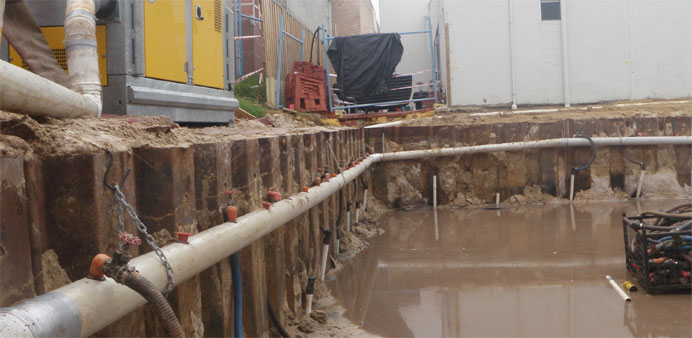Doha
Large-scale development, leaks from older infrastructure and seawater intrusion have resulted in a rising water table under much of Doha, a conference was told on Wednesday.
“The issue poses technical challenges and greatly increases the risk of polluting the sea and groundwater as construction projects pump water away from sites and it has already reached a critical state in some areas,” a scientist cautioned.
Leading figures from Qatar’s public and private sector came together at the event to discuss the threat of a rising water table to major infrastructure projects.
Hosted by Qatar Environment & Energy Research Institute (QEERI), Uniquip-Hoelscher and Hyder Consulting /Arcadis, the conference featured prominent speakers such as HE the Minister of Environment Ahmed Amer Mohamed al-Humaidi, Kahramaa president Essa bin Hilal al-Kuwari, and German ambassador Hans-Udo Muzel.
The renowned national and international environmental and water sustainability experts discussed risks to drinking water, fish stocks and public health that result from pollution entering groundwater or being discharged to the sea.
They evaluated the scientific as well as the economic aspects of ground water management in construction sites. It was pointed out that contractors as well as public institutions have to be enabled to use water management technologies, which protect fundamental social assets such as health and the environment. This way they will create competitive advantages for the sake of their citizens and the sake of the State of Qatar and its economy.
One discussion forum focused on best practices - from a governmental and regulatory standpoint. Companies from the private sector exposed case studies featuring leading technologies and innovative applications. The participants shared case studies about high profile international projects such as the Copenhagen Metro where the German company Hoelscher Group is active. With its Qatari Joint venture Uniquip-Holscher, it uses cutting edge groundwater treatment technologies at the Gold Line of the Doha Metro. Here as on other construction sites in Qatar the dewatering technology meet the demands of construction while also purifying the water to a quality that is able to be reused for any purpose.
“A large amount of water is extracted due to construction of many projects in Qatar. This water has much lower salinity than seawater; therefore, it requires far less energy to treat it. The treatment of construction water can save energy and could be reused for agricultural, industrial and domestic purposes,” explained Dr Mohamad Khaleel, executive director, QEERI.
Addressing the problem in a way that protects human health and the environment is a priority in the National Development Strategy and members of Qatar’s Permanent Water Resource Committee are working across government to set standards and regulations, it was pointed out.
As a nation built on the heritage of its coastline and entirely dependent on the Arabian Gulf for its source of drinking water and much of its fresh seafood, Qatar has set strict guidelines to ensure that development does not damage one of its most precious resources—water.

